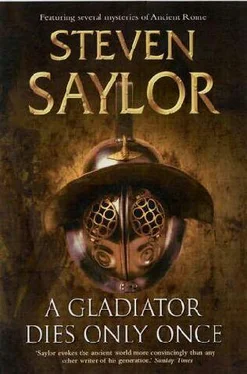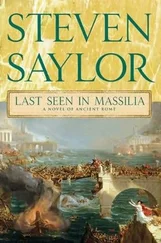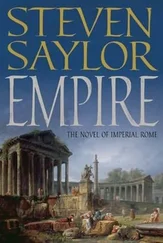Steven Saylor - A Gladiator Dies Only Once
Здесь есть возможность читать онлайн «Steven Saylor - A Gladiator Dies Only Once» весь текст электронной книги совершенно бесплатно (целиком полную версию без сокращений). В некоторых случаях можно слушать аудио, скачать через торрент в формате fb2 и присутствует краткое содержание. Жанр: Исторический детектив, на английском языке. Описание произведения, (предисловие) а так же отзывы посетителей доступны на портале библиотеки ЛибКат.
- Название:A Gladiator Dies Only Once
- Автор:
- Жанр:
- Год:неизвестен
- ISBN:нет данных
- Рейтинг книги:5 / 5. Голосов: 1
-
Избранное:Добавить в избранное
- Отзывы:
-
Ваша оценка:
- 100
- 1
- 2
- 3
- 4
- 5
A Gladiator Dies Only Once: краткое содержание, описание и аннотация
Предлагаем к чтению аннотацию, описание, краткое содержание или предисловие (зависит от того, что написал сам автор книги «A Gladiator Dies Only Once»). Если вы не нашли необходимую информацию о книге — напишите в комментариях, мы постараемся отыскать её.
A Gladiator Dies Only Once — читать онлайн бесплатно полную книгу (весь текст) целиком
Ниже представлен текст книги, разбитый по страницам. Система сохранения места последней прочитанной страницы, позволяет с удобством читать онлайн бесплатно книгу «A Gladiator Dies Only Once», без необходимости каждый раз заново искать на чём Вы остановились. Поставьте закладку, и сможете в любой момент перейти на страницу, на которой закончили чтение.
Интервал:
Закладка:
The third Syracusan, Margero, certainly looked and played the part of a pensive Greek poet. He was younger than his wealthy com-panions and quite handsome, with ringlike curls across his forehead, heavy lips, and a dark-browed, moody countenance. I gathered that his verses were quite fashionable at the moment in Syracusan intellectual circles, and I sensed that he was more an ornament than a friend to the two businessmen. He seldom laughed, and showed no inclination to recite from his poems, which was probably for the best, considering Cicero's snobbishness. For his part, Cicero only oc-casionally struck a patronizing tone.
There was talk of business regarding the port of Syracuse and the Sicilian grain harvest, talk of the season's dramatic festivals at the old Greek theater in the city, talk of the current fashions among the Syra-cusan women (who always lagged a few years behind the women of Rome, as Cicero felt obliged to point out). Much of the conversation was in Greek, and Eco, whose Greek was limited, inevitably grew rest-less; eventually I dismissed him, knowing he would find the conversa-tion much more fascinating if he could eavesdrop from the kitchen with Tiro.
Eventually, over fresh cups of wine after the final course of sa-vory onions stewed in honey with mustard seeds, Cicero steered the conversation to the past. He had spent his year in Sicily making himself an expert on the island's long and tumultuous history, and seemed quite pleased at the chance to demonstrate his knowledge to a native audience. Little by little his voice fell into a speechifying rhythm that invited no interruption. What he had to say was fascinating-I had never heard so many gruesome details of the great slave revolts that wracked Sicily in the previous generation-but after a while I could see that his Syracusan guests were growing as restless as Eco.
Cicero grew especially impassioned when he turned to Hiero, the ruler of Syracuse during its golden age. "Now there was a ruler, an example to all the other Hellenic tyrants who reigned over the Greek cities in his day. But then, you must know all about the glory of Hiero's reign, Margero."
"Must I?" said Margero, blinking and clearing his throat like a man awakening from a nap.
"Being a poet, I mean. Theocritus-his sixteenth idyll," Cicero prompted.
Margero merely blinked again.
"The sixteenth idyll of Theocritus," said Cicero, "the poem in which he extols the virtues of Hiero's reign and looks forward to his ultimate victory over Carthage. Surely you know the poem."
Margero blinked his heavy lashes and shrugged.
Cicero frowned disapprovingly, then forced a smile. "I mean those verses, of course, which begin,
"This is ever the business of Muses, of poets,
to sing praise to gods, to sing hymns to heroes…
"Surely, Margero…?"
The young poet stirred himself. "It is vaguely familiar." Dorotheus laughed softly. Agathinus's thin lips compressed into a smile. I realized that Margero was having Cicero on.
Cicero, oblivious, prompted him with more lines:
"Bravely the men of Syracuse grip their spears and lift up their wickerwork shields.
Among them Hiero girds himself like a hero of old, with a lion's head atop his helmet."
"Horsehair," Margero grunted.
"What's that?"
" 'With a plume of horsehair atop his helmet,'" said Margero, in-dolently raising an eyebrow. "Lion's head, indeed!"
Cicero reddened. "Yes, you're right-'with a plume of horse-hair…' Then you do know the poem."
"Slightly," allowed Margero. "Of course, Theocritus was just blowing hot air to try to get Hiero's favor. He was a poet without a patron at that particular moment; thought he might enjoy the climate here in Syracuse, so he dashed off an idyll to get Hiero's attention. Figured the tyrant might be shopping for an epic poet to record his victories over Carthage, so he sent some sycophantic scribbles by way of applying for the post. A pity Hiero didn't take him up on the offer-too busy killing Carthaginians, I suppose. So Theocritus dashed off another encomium, to King Ptolemy in Alexandria, and landed a job scribbling on the Nile instead. A pity, how we poets are always at the whim of the rich and powerful."
This was more than Margero had said all evening. Cicero eyed him uncertainly. "Ah, yes. Be that as it may, Hiero did drive back the Carthaginians, whether any poets were there to record it or not, and we remember him as a great ruler, in Rome, anyway. And of course, among educated men, his friend Archimedes is even more famous." Cicero looked for a nod from his guests, but the three of them only stared back at him dumbly.
"Archimedes, the mathematician," he prompted. "Not a philosopher, to be sure, but still among the great minds of his time. He was Hiero's right-hand man. A thinker in the abstract, mostly, consumed with the properties of spheres and cylinders and cubic equations, but quite a hand at engineering catapults and war machines when he set himself to it. They say that Hiero couldn't have driven the Carthaginians from Sicily without him."
"Ah," said Agathinus dryly, "that Archimedes. I thought you meant Archimedes the fishmonger, that bald fellow with a stall on the wharves."
"Oh, is the name really that common?" Cicero seemed on the verge of apprehending that he was being mocked, but pressed on, determined to lecture his Syracusan guests about the most famous Syracusan who ever lived. "I refer, of course, to the Archimedes who said, 'Give me a place to stand on, and I will move the earth,' and demonstrated as much to Hiero in miniature by inventing pulleys and levers by which the king was able to move a dry-docked ship by a mere flick of his wrist; the Archimedes who constructed an extraordinary clockwork mechanism of the sun, moon, and five planets in which the miniature spheres all moved together in exact accordance with their celestial models; the Archimedes who is perhaps most famous for the solution he devised to the problem of the golden crown of Hiero."
"Ah, now you are bound to lose me," said Dorotheus. "I've never had a head for logic and mathematics. Remember, Agathinus, how our old tutor used to have weeping fits, trying to get me to under-stand Pythagoras and all that?"
"Ah, but the principle of the golden crown is quite simple to explain," said Cicero brightly. "Do you know the story?"
"In a vague, general, roundabout way," said Dorotheus, with laughing eyes.
"I'll make the tale brief," promised Cicero. "It seems that Hiero gave a certain weight of gold to an artisan, with a commission to make him a crown. Soon enough, the man returned with a splendid gold crown. But Hiero heard a rumor that the artisan had pilfered some of the gold, and had substituted silver for the core of the crown. It weighed the correct amount, but was the crown made of solid gold or not? The piece was exquisitely crafted, and Hiero hated to damage it, but he could think of no way to determine its compo-sition short of melting it down or cutting into it. So he called on Archimedes, who had helped him with so many problems in the past, and asked if he could find a solution.
"Archimedes thought and thought, but to no avail. Gold was heavier than silver, that much he knew, and a blind man could tell the two apart by weighing them in his hands; but how could one tell if a given object was made of silver covered with gold? They say that Archimedes was sitting in a tub at the baths, noticing how the level of the water rose and fell as the bathers got in and out, when the solution suddenly came to him. He was so excited that he jumped from the tub and ran naked through the streets, shouting, 'Eureka! Eureka!'-'I have found it! I have found it!'"
Dorotheus laughed. "All the world knows that part of the tale, Cicero. And for better or worse, that's how the world pictures Archimedes-as an absentminded old genius."
Читать дальшеИнтервал:
Закладка:
Похожие книги на «A Gladiator Dies Only Once»
Представляем Вашему вниманию похожие книги на «A Gladiator Dies Only Once» списком для выбора. Мы отобрали схожую по названию и смыслу литературу в надежде предоставить читателям больше вариантов отыскать новые, интересные, ещё непрочитанные произведения.
Обсуждение, отзывы о книге «A Gladiator Dies Only Once» и просто собственные мнения читателей. Оставьте ваши комментарии, напишите, что Вы думаете о произведении, его смысле или главных героях. Укажите что конкретно понравилось, а что нет, и почему Вы так считаете.










